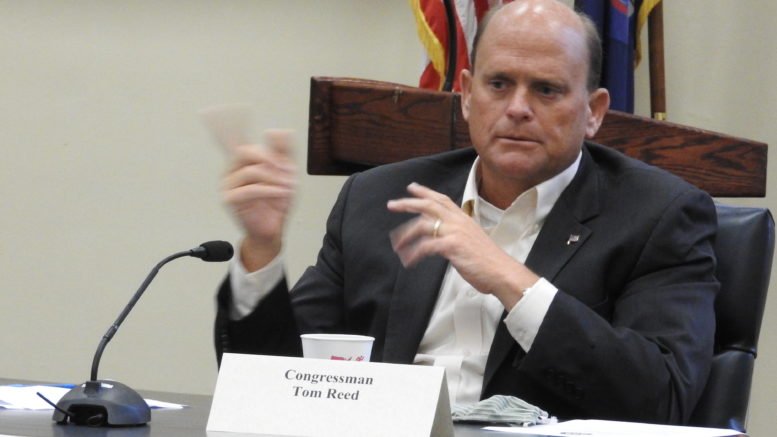Tioga County was busy last week as the area grapples with restrictions set in place for business openings, and life offers a small glimpse of normal. As of Thursday, there were 170 total cases reported in Tioga County, N.Y., and 69 in mandatory quarantine; a number that is expected to rise following the discovery of several positive cases from a large wedding held one week earlier.
Tioga County also started looking at what type of financial aid might be heading this way for local governments. With over a dozen county officials and lawmakers gathered at the county’s office building on Thursday, Congressman Tom Reed arrived to talk to about the State and Municipal Assistance for Recovery and Transition (SMART) Act, a bipartisan proposal that would provide state, county, and municipal governments with $500 billion in targeted financial aid.
According to Congressman Reed, the SMART ACT funding would be based on population size, infection rates, and revenue losses.
“I told Albany that they [local governments] are not looking to pad their accounts,” said Reed about his push to secure funding.
For this year, Tioga County will be okay, but officials cautioned that they have no idea what next year’s budget will look like.
“We are off by about 900,000 dollars to date,” said James McFadden, Tioga County’s treasurer. He added that the county is also losing about $120,000 a month in their share of tax revenue with the closure of Tioga Downs.
Tioga County’s Legislative Chair, Martha Sauerbrey, stated that ten percent was already cut from the 2020 budget, and that the county has remained conservative with its spending.
“We are in much better shape than most counties,” Chair Sauerbrey added.
Other things being addressed in Albany, according to Congressman Reed, include unemployment and an extension of the additional benefit of $600, childcare, broadband for rural and underserved areas, and recycling.
With the eviction moratorium ending on Aug. 20, local lawmakers are also concerned about evictions that might result from unpaid rent, and the financial affect it will have on the landlord and homeowner as well.
Some of the positives were discussed as well with lawmakers on Thursday to include a renewed focus on Buy Local, the emergence of tele-health, and new market and farm partnerships that have been formed.
As far as funding and state aid, which the county is relying on, Congressman Reed said that he should have some more answers by the beginning of August. In the meantime, county spending continues to be conservative as lawmakers work with the business community to keep the reopening moving forward.



Be the first to comment on "Discussions continue surrounding government and municipal funding"